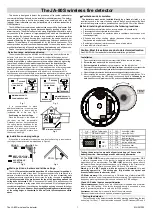
11
FINAL POINT
It is strongly recommended that users of the M-18A9 Gold Tester practice
testing for Gold Plate on a few items believed or known to be Gold Plated. A
few sets of practice runs will impart confidence to the point that the user will
find testing for Gold Plate to be fast and easy.
GOLD COMPOSITION
There are four basic colors of Gold
1.
Yellow ………………………most common
2.
White ………………………..second most common
3.
Red (Pink/Rose) …………….uncommon
4.
Green ………………………..very uncommon
The colors are obtained by the use of two or more varied quantities of base
metals. These base metals are Silver, Copper, Zinc and Nickel. Not only are
there four basic colors, but each color can and does vary the percentages of the
base metals. As such, there is no specific formula for each color of Gold. This
makes for a range of readings in each color, plus a variation in each color at any
specific Karat mixture.
The M-18A Gold Tester can distinguish between Karats of the two popular
colors, Yellow and White by means of a color selector switch. Most red color
Gold can be determined by using the White range selector position. Most green
color Gold can be determined by using the Yellow range selector position.
There are no ranges that are compatible for use on dental Gold alloys.
CAUTION
– The M-18A9 Gold Tester is a highly accurate, precision instrument
for determining Gold Karat values. However, should any disagreement arise
with its use, it is recommended that a confirmation be obtained with a Fire Assay
examination process. This device, although highly accurate, should be used as a
guide to Gold Karat values. The exactness of the device depends on adherence
to the instructions provided in this manual and the knowledge of the base metal
alloys that are involved.






























